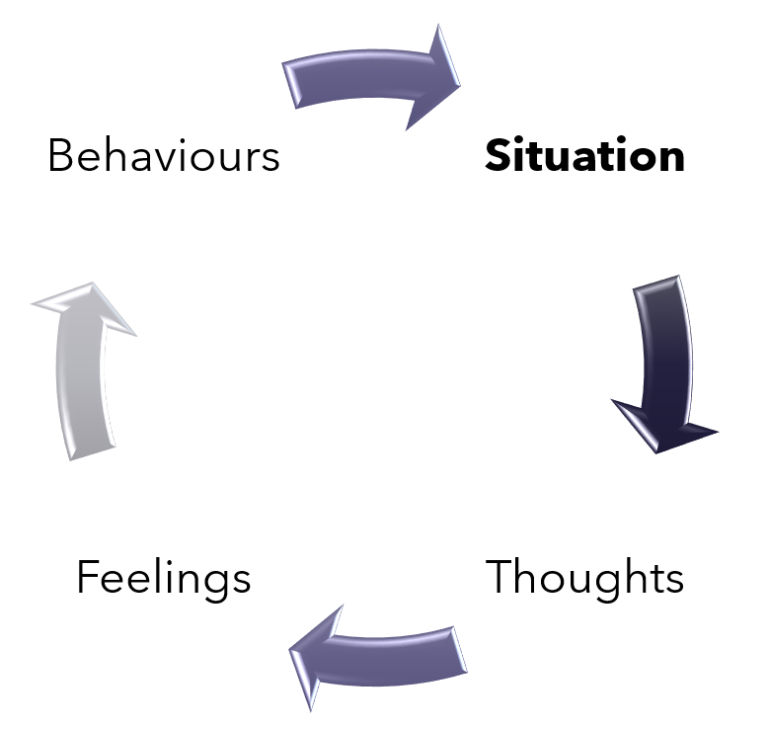One, if not the biggest, finding in talk therapy (psychotherapy), such as CBT therapy, was the consistently replicated evidence that our feelings (emotions) don’t exist in a vacuum, and they are not created by a situation either: our thoughts create them, based on the situations. Cognitive reframing helps us to understand and manage them better.
Table of Contents
Looking at a simple example, if team A and B playing against each other, and B loses and A wins, I might be sad or happy – but that does not depend on the objective outcome, but rather, on my thoughts about that outcome (if A won and I was rooting for A, I’m happy, and vice versa).

Therefore, most therapeutic interventions would try to change our thoughts, which then changes our feelings, to help us with our mood, worries, or unhelpful behaviours.
What is cognitive reframing?
Cognitive reframing, more often labelled as “cognitive restructuring” in therapeutic manuals, is a technique that helps with identifying our distorted beliefs and thoughts, challenging them with logic and data, shaping/reframing/replacing them with more realistic thoughts, and then testing these new thoughts out in the real world to accept them moving forward.
A simple example could be an irrational thought that “If I left my home, I would most certainly collapse within a few meters, and could not get help”. We would look at these more objectively to challenge it (“Have you left the house before? How far did you make it before collapsing? Did you collapse all the time?”), and reframe it so it is more realistic (“If I left my home, I might collapse, and I might not be able to get help”). Then, we could test it: leave the home, walk a bit and see what happens. If the collapse did not happen, then maybe this thought is not 100% accurate.
Cognitive Reframing: a universal tool for wellness or targeted treatment for mental illness?
We all have irrational thoughts, and using this technique can help us manage our mental well-being a bit better. Who wouldn’t worry about missing a flight, being late for an exam, or losing a job? But how often do these things actually happen?
Having said that, cognitive restructuring is a core principle in almost all cognitive therapies (therapies that help with changing our thoughts) and is most often used to treat mental disorders.
Implementing cognitive reframing
Different therapists and different books use different techniques, and there is little research on how much more effective one exact method is compared to others. However, we know that the more involved a person is in therapy, the more likely they will see change.
Having said that, getting the person to write out the irrational thoughts, their predictions of how a certain situation would pan out (as in, with pen and paper, or keyboard and computer), then adding how it actually panned out helps our minds to process this new information more thoroughly.
There is research on handwriting helping us process information more deeply, but realistically, I have not seen many people with pen and paper these days; writing it down somewhere (phone, computer), is essential, however.
When is cognitive reframing the most helpful?
Perhaps it is more helpful to think about what mental disorders would not benefit from cognitive restructuring. Most mental disorders influence how we perceive ourselves, others around us, and more generally, how the world is. We may predict danger in all situations (generalised anxiety), or just in social situations (social anxiety), feel worthless and incapable (low mood and depressive disorders), think that we have no way to stop drinking (substance use disorder), believe if we do not check the stove exactly a dozen times something terrible would happen (obsessive-compulsive disorder).
These are all distorted, illogical thoughts that we accept as true and accurate. All these thoughts then create unpleasant feelings, which we then try to do something about, ultimately changing our behaviours. Therefore, changing these thoughts would help, no matter what exact disorder they are associated with.
What kind of therapist can help with cognitive reframing?
The most evidence-based therapy is Cognitive Behavioural Therapy (CBT), and most licensed (or “registered”, depending on which country you live in) psychologists are trained to deliver it effectively. There are, of course, other therapies, but I would not recommend chasing the newest and greatest when it comes to therapy: unlike fashion, the way our brain works does not change every couple of years, and the more research evidence we have for a therapy modality, the more it is likely it would help you too.
What to expect in therapy regarding cognitive reframing?
Be prepared to change and do the hard work. This is something that is not obvious to people starting therapy: the work mostly happens between sessions, not during the session.
Unlike a medical intervention, when most change happens in the clinics, your psychologist is more like a personal trainer, checking in weekly with you. If you don’t “lift the weight”, your therapist cannot lift it for you.
When is cognitive reframing not helpful?
If our thoughts are painful but actually accurate, cognitive reframing should not be attempted. The most obvious example is adjusting to a new reality, such as after losing a loved one or learning to live with a new, less functional body. In these cases, therapists can focus on helping process the new reality and problem-solving on how to adjust and move forward. Cognitive reframing is a powerful tool but needs some practice. Talk to us to get started!
Please note that this blog post by Personal Psychology is not intended to provide professional advice. If you or someone you know is experiencing mental health difficulties, it is important to seek help from a qualified healthcare professional.





